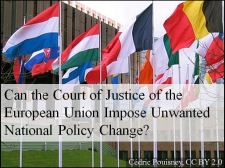Commentary by Alberto MANZI
One of the main criticisms of TTIP concerns the prospect that Investment State Dispute Settlements (ISDS) will encroach upon the democratic will of the people represented by national governments. However, ISDS allow investors to sue states for violating rules established in treaties like TTIP, a key process if international trading is to be regulated. For example, if a state illegally seizes an investor’s asset or violates a legal agreement with an investor, the ISDS would force the government to compensate the victim or reverse its decision. This simple element of fairness brings states under the rule of law and serves only to underpin international treaties.

The argument against TTIP is that it constrains national policy-making, thereby limiting the scope of democratic politics. This is a valid criticism, but those who advance it argue from a perspective of national sovereignty and would therefore presumably oppose the EU itself, the WTO and other international institutions. These are sound arguments on their own terms, but imply far less international cooperation and a diminution of international trade – a primary objective of TTIP.
Consequentialist critics, on the other hand, argue that governments should not have to pay compensation for a change of policy that would be otherwise beneficial. However this legitimises any kind of confiscatory behaviour by allowing states to violate established rules with impunity. If, for example, a government violates a legal agreement with a mining company agreeing not to raise taxes on a particular metal, the latter would be entitled to compensation based on the law of tort. However, convincing the judiciary of the same host country may be difficult where the separation of powers is not entrenched, thus the need for an international tribunal than can mediate such matters.
Thus, the benefit of ISDS is that it provides a secure environment for foreign investment, which benefits both the investors and the host nations, particularly those with dubious legal systems. As such, it is a boon to poorer, less developed countries affording certainty to investors where the state’s institutions are unconvincing.
RELATED ARTICLES:





